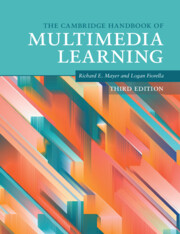Book contents
- The Cambridge Handbook of Multimedia Learning
- The Cambridge Handbook of Multimedia Learning
- Copyright page
- Contents
- Figures
- Tables
- Contributors
- Preface
- Acknowledgments
- Part I Background
- Part II Theoretical Foundations
- Part III Basic Principles of Multimedia Learning
- Part IV Principles for Reducing Extraneous Processing in Multimedia Learning
- Part V Principles for Managing Essential Processing in Multimedia Learning
- 19 Principles for Managing Essential Processing in Multimedia Learning
- 20 The Modality Principle in Multimedia Learning
- 21 The Transient Information Principle in Multimedia Learning
- Part VI Principles Based on Social and Affective Features of Multimedia Learning
- Part VII Principles Based on Generative Activity in Multimedia Learning
- Part VIII Multimedia Learning with Media
- Author Index
- Subject Index
- References
19 - Principles for Managing Essential Processing in Multimedia Learning
Segmenting, Pre-training, and Modality Principles*
from Part V - Principles for Managing Essential Processing in Multimedia Learning
Published online by Cambridge University Press: 19 November 2021
- The Cambridge Handbook of Multimedia Learning
- The Cambridge Handbook of Multimedia Learning
- Copyright page
- Contents
- Figures
- Tables
- Contributors
- Preface
- Acknowledgments
- Part I Background
- Part II Theoretical Foundations
- Part III Basic Principles of Multimedia Learning
- Part IV Principles for Reducing Extraneous Processing in Multimedia Learning
- Part V Principles for Managing Essential Processing in Multimedia Learning
- 19 Principles for Managing Essential Processing in Multimedia Learning
- 20 The Modality Principle in Multimedia Learning
- 21 The Transient Information Principle in Multimedia Learning
- Part VI Principles Based on Social and Affective Features of Multimedia Learning
- Part VII Principles Based on Generative Activity in Multimedia Learning
- Part VIII Multimedia Learning with Media
- Author Index
- Subject Index
- References
Summary
When a multimedia lesson containing complicated material is presented at a fast pace, the result can be a form of cognitive overload called essential overload. Three multimedia design methods intended to minimize essential overload are the segmenting, pre-training, and modality principles. The segmenting principle is that people learn more deeply when a multimedia message is presented in learner-paced segments rather than as a continuous unit. The pre-training principle is that people learn more deeply from a multimedia message when they know the names and characteristics of the main concepts. The modality principle is that people learn more deeply from a multimedia message when the words are spoken rather than printed.
Keywords
Information
- Type
- Chapter
- Information
- The Cambridge Handbook of Multimedia Learning , pp. 243 - 260Publisher: Cambridge University PressPrint publication year: 2021
References
Accessibility standard: Unknown
Why this information is here
This section outlines the accessibility features of this content - including support for screen readers, full keyboard navigation and high-contrast display options. This may not be relevant for you.Accessibility Information
- 17
- Cited by
